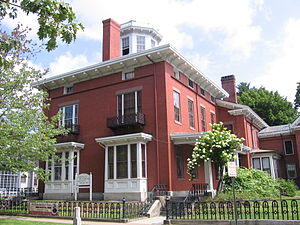Pejepscot Historical Society

The Pejepscot Historical Society, located in Brunswick, is one of the oldest historical societies in the state of Maine. Founded in 1888, the Society's mission is to preserve and celebrate the history of the Pejepscot region, which includes the towns of Brunswick, Harpswell and Topsham.
History of the society[]
Beginnings[]
The Society was founded by 16 local citizens who officially met for the first time on January 10, 1888 at the Brunswick Selectmen's Room in the Odd Fellows building.[1] At the time, the town of Brunswick was recognized as the largest and wealthiest in the state and was nearing its 150th anniversary. Brunswick's rapid industrialization "inspired many to look back at the lifestyles, traditions, and history of the area soon to be lost."[2]
At this first meeting the group adopted a set of by-laws, elected officers, approved a regular meeting schedule and established membership dues at $1. The group's first order of business was to plan Brunswick's 150th anniversary celebration, scheduled for June 13, 1889.[3] Originally referred to as "Local Historical Society", by the time of its legal incorporation in December 1891 the group had chosen the name "Pejepscot Historical Society" to reflect the history of not just the town of Brunswick but of the region.[4]
By 1889 the young Society had already amassed a collection of approximately 500 artifacts and it was quickly becoming clear that a designated Society building was needed. In 1891 charter member John Furbish purchased the 1827 First Congregational Church building on School Street (later known as the Varney Lecture Hall) in Brunswick for the Society's use at the price of $1,000. The organization then worked to raise the $1000 (as well as an additional $500 for repairs) needed to buy the building from Furbish. By the end of 1892 the Pejepscot Historical Society had its first home and on May 3, 1893 the first artifacts were moved into the School Street building.[5]

Charter members[]
- Ira P. Booke, elected Society's first secretary & treasurer
- Henry L. Chapman, Bowdoin College professor
- Reverend W.P. Fisher
- John Furbish
- D.D. Gilman
- Reverend Edward C. Guild
- Henry Johnson, Bowdoin College professor & elected Society's first vice president
- Charles S.F. Lincoln, later elected Society president (1947–1949)
- Theodore S. McLellan
- Edward P. Pennell
- Barret Potter, lawyer
- Frank E. Roberts
- Lyman E. Smith
- George L. Thompson
- Weston Thompson, lawyer
- Henry Warren Wheeler, elected the Society's first president (1888–1893)
Decline and rejuvenation[]
From 1908 to 1922 only one Society meeting was held, due in part to the deaths of a large portion of the group's members and founders. Following this lengthy period of inactivity, in May 1923 a meeting was held to reorganize the historical society. The success of a lecture series which brought prominent speakers to the town helped revitalize the Society and in 1939 the group played a prominent role in Brunswick's bicentennial celebration.[4]
Issues with the Varney Lecture Hall pushed the organization to search for a new, larger, heated space beginning in 1955. In 1974 the Society purchased a large Italiante brick building at 11 Lincoln Street known as the McManus-Richardson House and began moving their collection (now numbering over 1,500 artifacts) into the building.[4]
Establishment of museums[]
In March, 1982 Dr. Alice Skolfield Whittier offered her half of a Park Row duplex and its contents to the organization as what was called by then-president F. Burton Whitman "the biggest and best gift ever made to our Society."[6] The building, now known as the Skolfield-Whittier House, serves as a veritable time capsule of Victorian life. Not long after this, the owners of the building adjoining the Skolfield-Whittier House sold their property to the Society so that the organization might be headquartered near its first separate museum. To help fund this purchase, the Society sold their building at 11 Lincoln Street and relocated to the Park Row duplex.[4]
Later that same year the former home of Civil War hero Joshua L. Chamberlain, on the corner of Maine and Potter Streets, was auctioned off following the death of its owner. At the request of local citizens, the Society purchased the building and began extensive restoration work. In July 1984 the house was opened to the public as the Joshua L. Chamberlain Museum.[4]
Today, the Pejepscot Historical Society operates tours of the Chamberlain Museum and Skolfield-Whittier House while featuring rotating exhibits of local history at its 159 Park Row headquarters.
See also[]
- Joshua L. Chamberlain Museum
- Joshua L. Chamberlain
- Skolfield-Whittier House
- Brunswick, Maine
- Harpswell, Maine
- Topsham, Maine
References[]
- ^ "Pejepscot Historical Society Was Church in 1841", Coastal Journal, July 1, 1970, page 3.
- ^ Hudson, Katherine B. "Of Leaders and Loyalty: The Pejepscot Historical Society, 1888–1987". Maine Historical Society Quarterly, vol. 26, no.4 (Spring 1987), page 237.
- ^ "General Background Information", Pejepscot Historical Society Research File, 1989.
- ^ Jump up to: a b c d e Hudson, pp. 236–250.
- ^ "Facts About the Pejepscot Historical Society Building", Pejepscot Historical Society Research File
- ^ Hudson, page 246.
External links[]
- Historic preservation organizations in the United States
- History of New England
- Historical societies in Maine
- Buildings and structures in Brunswick, Maine
- Tourist attractions in Brunswick, Maine
- Museums in Cumberland County, Maine
- 1888 establishments in Maine
